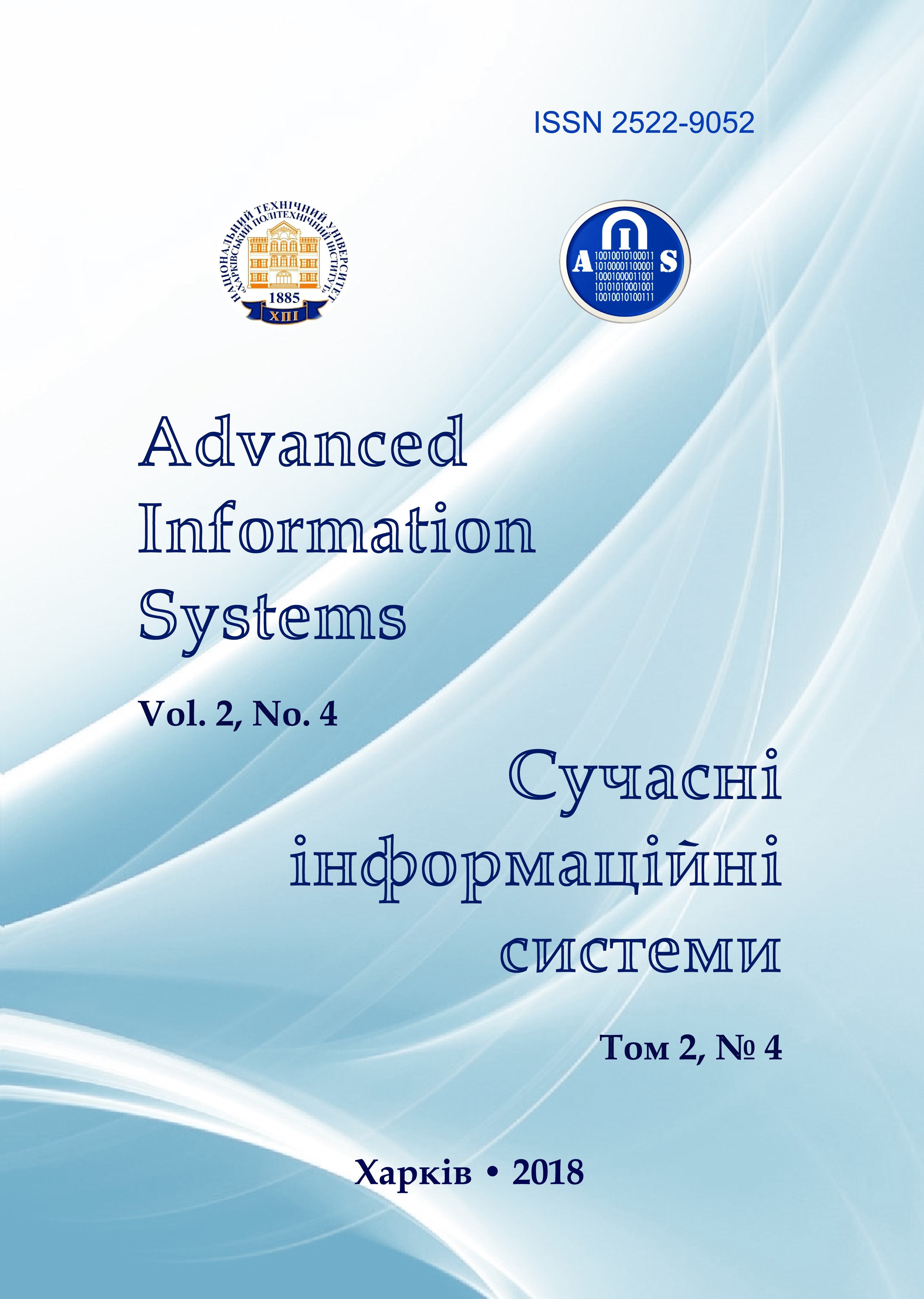Support decision-making in information control systems using the temporal knowledge base
Main Article Content
Abstract
The subject matter of the article are the processes of using temporal knowledge to support decision-making on the control of composite objects within the framework of the enterprise functioning paradigm. The goal is to develop an integrated approach to building, as well as the use of temporal knowledge bases for analyzing the current state of the enterprise as an integral object at different levels of the organizational hierarchy and decision support for control. Tasks: to develop a model of the temporal knowledge base for the presentation of context-oriented temporal dependencies on the behavior of the control object; improve the method of detecting anomalous states of the control object based on the analysis of temporal data and knowledge; to present technologies for the automated construction and use of a temporal knowledge base to support decision-making on enterprise management. The methods used are: methods of construction knowledge bases and methods of supporting management in conditions of uncertainty. The following results were obtained. The following results were obtained. A model of a temporal knowledge base has been developed for use in information management systems. The method of detecting anomalous states of the control object in information control systems based on the use of temporal dependencies has been improved. Technologies for building and using a temporal knowledge base to support management decisions under uncertainty are proposed. Conclusions. The scientific novelty of the results obtained is as follows: A model of a temporal knowledge base has been developed, containing patterns and the realization of logical facts reflecting the state of the control object, as well as the rules establishing the links between these states over time. The model makes it possible to increase the efficiency of enterprise management in conditions of uncertainty based on an analysis of its current state and the derivation of permissible sequences of actions for the transition to a target state. The method for detecting anomalous states of a control object in information control systems has been improved by taking into account the connection between actions at the control object and the context for performing these actions. The method allows to take into account the current properties of the components of the complex control object to classify the current state in conditions of uncertainty. The proposed technology for the construction and use of a temporal knowledge base in information management systems that provide for the iterative replenishment of knowledge in the operation of an enterprise and their use in the context of incomplete information about the control object.
Article Details
References
Sljivic, S. Skorup, S. and Vukadinovic, P. (2015), “Management control in modern organizations”, International Review, Vol. 4-5, pp. 39-49.
Dechow, N., Granlund, M. and Mouritsen, J. (2007), “Management control of the complex organization – relationships be-tween management accounting and information technology”, Handbook in Management Accounting Research, Elsevier, Ox-ford, pp. 625-640.
Chala, O. (2018), “Logical-probabilistic representation of casual dependencies between events in business-process manage-ment”, Advanced information systems, Vol. 2, No. 2, pp. 40-44, DOI: https://doi.org/10.20998/2522-9052.2018.2.07.
Kalynychenko, O., Chalyi, S., Bodyanskiy, Y., Golian, V. and Golian, N. (2013), “Implementation of search mechanism for implicit dependences in process mining”, 2013 IEEE 7th International Conference on Intelligent Data Acquisition and Ad-vanced Computing Systems (IDAACS). Institute of Electrical and Electronics Engineers (IEEE), DOI:
https://doi.org/10.1109/idaacs.2013.6662.
Kendal, S.L. and Creen, M. (2007), An introduction to knowledge engineering, Springer, London, 290 р.
Levykin, V. and Chala, O. (2018), “Method of automated construction and expansion of the knowledge base of the business process management system”, EUREKA: Physics and Engineering, Vol. 4. pp. 29-35.
Chala, O. (2018), “Construction of temporal rules for representing knowledge in information control systems”, Advanced in-formation systems, Vol. 2, No. 3, pp. 54-59.
Chala, O. (2018), “Models of temporal dependencies for a probabilistic knowledge base”, Econtechmod, Vol. 07, No. 3. pp. 53-58.
Levykin, V. and Chala, O. (2016), “Modelling less-structured knowledge-intensive business process”, Bulletin of the Kherson National Technical University, No. 4(59). pp. 195-202.
Levykin, V. and Chala, O. (2016), “The Model of Knowledge-Intensive Business Process for the Process Mining”, Control systems and machines, No. 6, pp. 59-66.
Levykin, V. and Chala, O. (2018), “Method of automated construction and expansion of the knowledge base of the business process management system”, EUREKA: Physics and Engineering, No. 4, pp. 29-35.
Levykin, V. and Chala, O. (2018), “Method of determining weights of temporal rules in markov logic network for building knowledge base in information control system”, EUREKA: Physics and Engineering, Vol. 5, pp. 3-10. DOI: http://dx.doi.org/10.21303/2461-4262.2018.00713.
Levykin, V. and Chala, O. (2018), “Development of a method of probabilistic inference of sequences of business process activi-ties to support business process management”, Eastern-European Journal of Eenterprise Technologies, No. 5/3(95), pp. 16-24. DOI: https://doi.org/10.15587/1729-4061.2018.142664.
Chala, O. (2018), “The method of hierarchical inference in the knowledge base of the information control system in the "Enter-prise 2.0" paradigm, Control Systems, Navigation and Communication, No. 4 (50), pp. 86-90.
Chala, O. (2018), “Method for detecting anomalous states of a control object in information systems based on the analysis of temporal data and knowledge”, EUREKA: Physics and Engineering, Vol. 6, pp. 28-35. DOI: https://doi.org/10.21303/2461-4262.2018.00787.
Chala, O. (2016), “Developing a method of forming a multi detailed representation of the knowledge-intensive business pro-cess”, Bionics of intelligence, No. 2 (87), pp. 101-105.
Levykin, V. and Chala, O. (2017), “Model of lifecycle of knowledge-intensive business process”, Control systems and ma-chines, No. 1. pp. 68–76, 85.
Levykin V. and Chala O. (2018), :Supporting for managing the composite object in the MIS using temporal dependencies”, Bionics of intelligence, No. 1(90), pp. 77-83.
